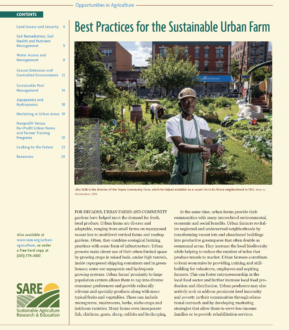Access to reliable and affordable water is critical for all farming operations. For urban farmers, water access can be especially challenging because many have to depend on relatively expensive municipal water. Depending on your region, installing a permanent water line on your urban farm can be an expensive process, often costing thousands of dollars. Contact local utilities early to determine if a vacant lot you’re considering for a farm has reliable access to water. Fortunately, with the increased interest in urban food production, more cities are providing support for urban farms and gardens. In some cases, local governments may offer programs to subsidize equipment installation and water costs. Baltimore City, for example, offers reduced water costs for people gardening on land through their Adopt-a-Lot program, which allows residents, nonprofits or businesses to use city-owned lots without tax or ownership obligations.
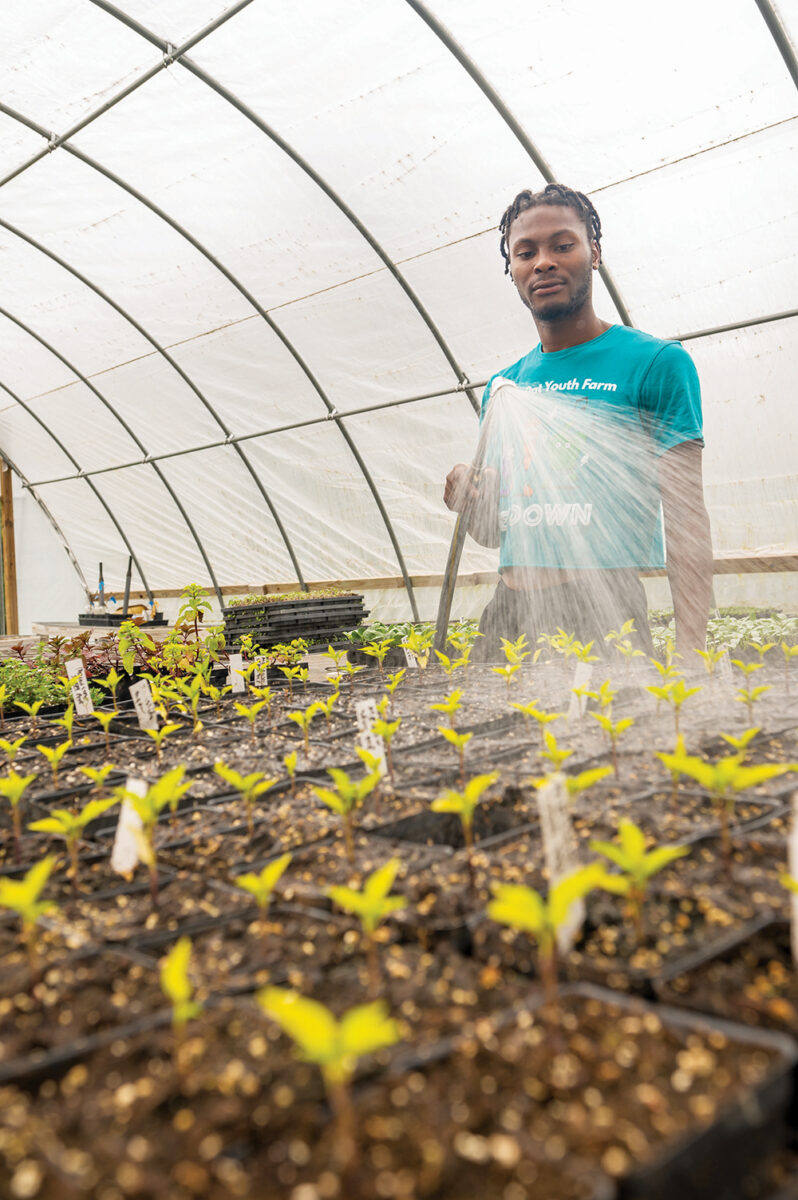
Water conservation practices not only save water, they also save money and provide other benefits, such as reduced levels of pests and diseases, and improved crop productivity through their emphasis on soil health. One of the best ways to manage soil water is by producing crops in healthy, porous soil. Healthy soil with good tilth and soil structure acts like a sponge by soaking up water and retaining it for crop use, especially during times of heat and drought. Plants grown in dense urban areas are more prone to heat stress because buildings and roads absorb heat and raise the temperature of urban environments.
Plants grow more vigorous root systems in healthy soils, allowing them to access water from more of the soil surface. Wherever possible, incorporate living (cover crops and living mulches) and dead (crop residues, composts, mulches and manures) sources of organic matter into the soil and continually build soil health. These added organic matter materials help build soil structure, which in turn helps store water, which further encourages plant growth. Conservation tillage strategies like no-till, reduced till, and strip till are encouraged to reduce disturbance caused to the soil.
You can also conserve water by managing the types of crops you grow. When planning crops for the upcoming season, consider the water requirements for each and aim to feed the crops optimally, or grow crops that are more suited for your environment or the season. Avoid growing water-intensive crops when access to water is unreliable or cost prohibitive. Low-water-use crops such as beans, mustard greens or lettuce may be better alternatives in this situation.
Recordkeeping is an important part of all farm management, and this applies to water management as well. Monitoring is the key to measuring and conserving water. Read your water meter and keep track of the amount of water your operation is using. Many urban producers rely on watering cans and garden hoses to water crops, but it’s hard to track your water use this way. To use and manage water more effectively, consider installing an efficient irrigation system and water meters to deliver only the necessary amounts of water to crops. Drip irrigation is one of the most efficient methods for this, as it avoids wetting crop foliage (which encourages plant pathogens) and minimizes water lost to evaporation. When long periods of extreme heat are a concern, drip irrigation combined with mulching is a good way to conserve water while reducing heat stress to plants.
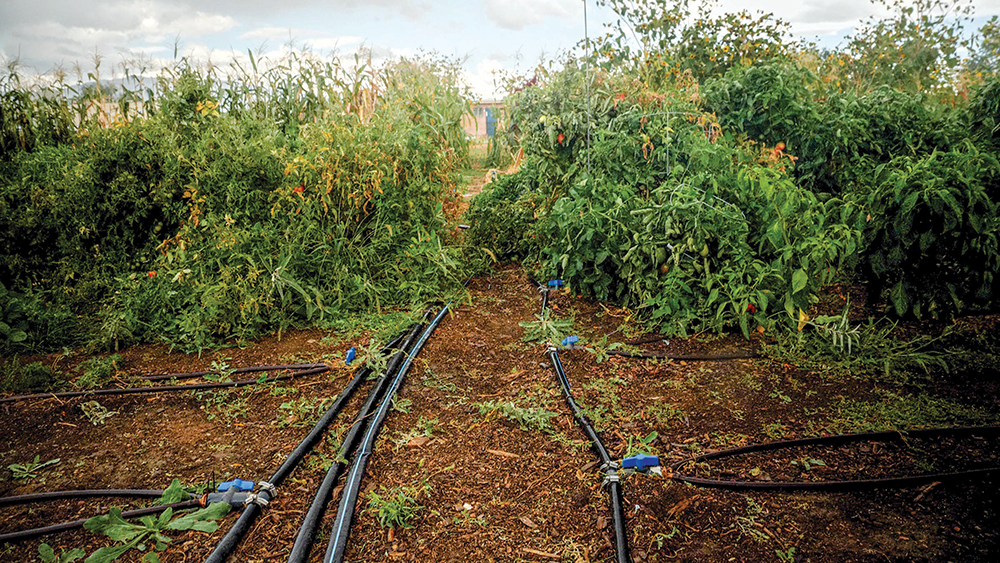
Routinely inspect and maintain your irrigation system to ensure it’s working properly. NRCS’s Environmental Quality Incentives Program (EQIP) provides technical assistance and funding for producers transitioning to drip irrigation. Regardless of what watering system you use, schedule your irrigation activities earlier in the day or at night to reduce water loss to daytime evaporation.
If your farm includes many rooftops, for example high tunnels, greenhouses or other buildings, then rainwater catchment may be a viable strategy to supplement your farm’s water needs. However, certain areas may have safety concerns about heavy metals or pathogens contaminating harvested rainwater. GrowNYC, an environmental nonprofit, has released a Rainwater Harvesting How-To Guide that provides guidelines for safely planning and building rainwater harvesting systems. Be sure to check on local policies regarding rainwater harvesting and using stormwater runoff. Learn more about water conservation and smart water use in SARE’s bulletin, Smart Water Use on Your Farm or Ranch.
Profile: Using Water Recapture to Save on Water Costs
Minnesota
FNC13-909: Water Capture from High Tunnel Diversion into Irrigation System Using Renewable Energy
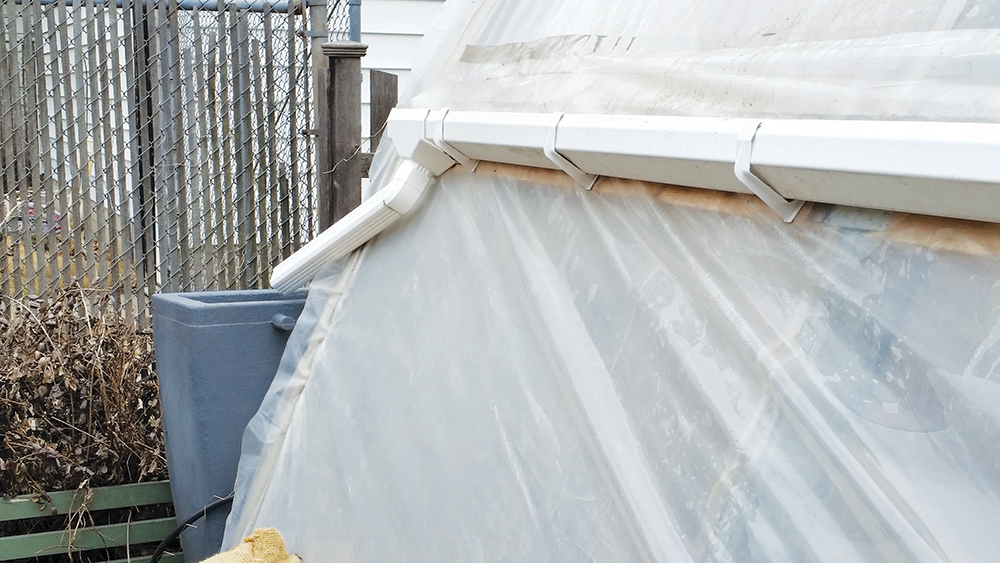
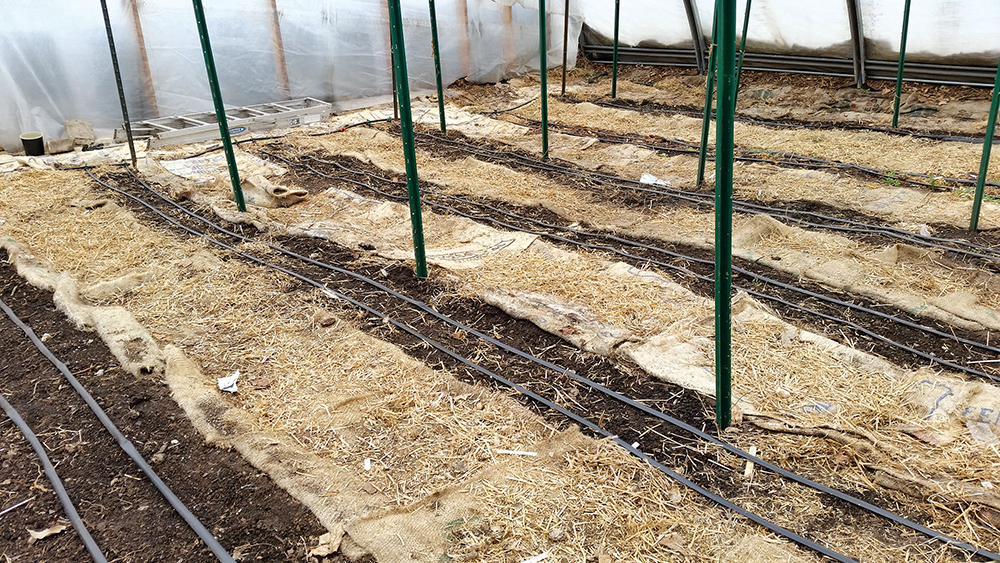
At Holistic Health Farms, located in the Twin Cities area of Minnesota, growers Cherry Flowers and Tim Page demonstrate how urban farms can be both sustainable and productive. Having over 18 years of combined experience with organic farming on lots across the Twin Cities, they produce a wide variety of high-tunnel-grown fruits and vegetables like tomatoes and peaches, and value-added products like specialty infused vinegars. Farming in a high tunnel allows them to plant a month earlier and harvest a month later than typical outdoor production. A common challenge for urban farms is inconsistent access to water and the often high cost to keep crops well irrigated.
Considering their project a success, they estimate that for every inch of rain, their modified high tunnel system can divert as much as 600 gallons of water from the municipal water system. Other advantages of the system include erosion reduction and the use of alternative sources of power and water. The addition of the gutters protects crops near the high tunnel by directing rainwater into a collection tank rather than it pouring off sides of the roof and onto crops. As a result of their work, they were recognized by the Capitol Region Watershed District, which also provided funds in support of their project. Holistic Health Farms serves its community by producing healthy foods and providing education, training and consulting services on sustainable practices such as organic farming, crop rotation, cover crops, composting, and succession and companion planting, among others. From 2017 to 2019, Holistic Health Farms participated in a SARE Partnership grant project (ONC17-029) to develop hands-on high tunnel education and training for immigrant farmers in the Twin Cities area. As part of this grant, Holistic Health Farms demonstrated how cover crops like red clover, rye, peas and vetch are grown and managed in a high tunnel.
In 2013, Flowers and Page received a SARE Farmer/Rancher grant to develop a water conservation system for their high tunnel that collects rainwater and recycles it to irrigate their crops through a drip system. To do this, they collaborated with the University of Iowa State Extension and installed gutters along the sides of their high tunnel that would collect rainwater and store it in nearby 50-gallon rain barrels. They also installed a solar-powered water pump to pump rainwater from the barrels into the high tunnel drip irrigation system.
